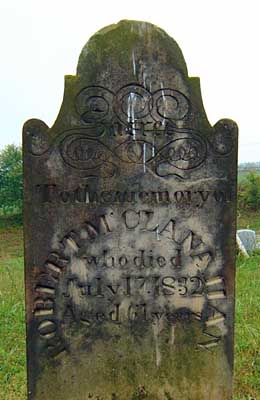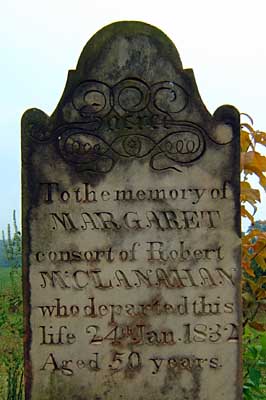

(1771-1832)
(1782-1832)

|

|
|
Robert McClanahan
(1771-1832) |
Margaret Doake McClanahan
(1782-1832) |
THE TREATY OF GREENVILLE
Robert McClanahan, our ancestor, grew to manhood as our country went through the throes of Revolution and Continental Congress. He and his [first] wife Isabell set up their first home near the Natural Bridge in Virginia as the new republic was beginning its first labors.
As soon as the Treaty of Greenville opened the Northwest Territory to settlement [signed December 22, 1795], the restless frontiersmen poured in. The stockaded Marietta and Cincinnati spread upstream into the fertile plains of the Muskingum and the Miami.
With the swarming Dissenters came the "Old Seseeder," John McClanahan. He, too, early moved into the Ohio country, the Virginia Military District. He settled far up on Eagle Creek in the wilderness and happily began the immense task of the pioneer.
In about 1799, When little John McClanahan was five years old, he, with his father and his little brother Samuel, came too.
It seems strange today that these frontiersmen, Robert and John McClanahan, keen judges of land as they were, should by-pass the fat valley levels and ascend to the high hills before locating their claims. They knew the land; but too well had they found there was death in the valley. All undrained, clogged with underbrush, and with the swamps alive with insects, the valley bred malaria, "chills and fever."
The two McClanahan families were not long alone in the Ohio wilderness. Soon the country side was dotted with little clearings, the homes of Virginians. They spread up the Scioto and its Paint Creek and settled about the old Indian Chillicothe.
Perhaps the most welcome arrival of the Eagle Creek neighborhood was their old pastor from the Natural Bridge, the Reverend William Baldridge. Mr. Baldridge was of such scholarly attainment that he had twice been offered the presidency of the Washington University at Lexington which was to become Washington & Lee. Though fitted for the task both by education and temperament, the scarcity of ministers impelled him to remain in his pastorate. Whooly opposed to slavery, he was a leader in the migration movement to Ohio.
Scarcely had he arrived than he was greeted by the McClanahans. "Now we can have a school."
Education was a serious matter to a little child in an Associate Reformed home. Before he could unite with his church, he must be able to read and understand his Bible and be well acquainted with his catechism.